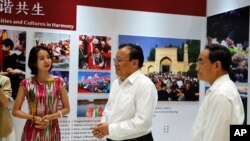ພວກເຈົ້າໜ້າທີ່ລັດຖະບານ ໃນເຂດຊິນຈຽງ ຂອງຈີນ ໃນວັນອັງຄານວານນີ້ໄດ້ກ່າວ
ປ້ອງກັນ ໃນອັນທີ່ເອີ້ນວ່າ ເປັນ “ສູນສຳມະນາ” ຂອງຈີນ ສຳລັບພວກຊົນກຸ່ມນ້ອຍຊາວ
ມຸສລິມ ໂດຍກ່າວວ່າ ເປັນສູນບໍລິການເພື່ອຕໍ່ຕ້ານຫົວຮຸນແຮງທາງສາສະໜາ ແລະ
ພວກກໍ່ການຮ້າຍ.
ບັນດາກຸ່ມປົກປ້ອງສິດທິມະນຸດໄດ້ກ່າວຫາບັນດາສູນເຫລົ່ານີ້ ພົວພັນຢູ່ເປັນປະຈຳ ກັບ
ການລະເມີດສິດທິຢ່າງກວ້າງຂວາງ. ອີງຕາມການກະປະມານໂດຍອົງການສະຫະປະຊາ
ຊາດແລ້ວ ຈີນໄດ້ກັກຂັງ 1 ລ້ານຄົນຢູ່ໃນສູນເຫລົ່ານີ້. ບັນດາກຸ່ມປົກປ້ອງສິດທິມະນຸດ
ກ່າວວ່າ ສ່ວນໃຫຍ່ແລ້ວເປັນຊາວວີເກີ້. ຈີນໄດ້ຕົກຢູ່ພາຍໃຕ້ການກວດສອບຂອງສາກົນ
ກ່ຽວກັບການປະຕິບັດຕໍ່ຊາວວິເກີ້ ແລະບັນດາສະມາຊິກຊົນກຸ່ມນ້ອຍມຸສລິມອື່ນໆ.
ຈີນກ່າວວ່າບັນ ດາສູນເຫລົ່ານີ້ເປັນບ່ອນເຝິກອົບຮົມວິຊາອາຊີບ ທີ່ເຮັດໃຫ້ມີຄວາມຊຳ
ນານໃນວຽການ ແລະຫລຸດຜ່ອນຫົວຮຸນແຮງ. ນອກນັ້ນປັກກິ່ງຍັງໄດ້ປະກາດໃນວັນອັງ
ຄານວານນີ້ວ່າ ສ່ວນໃຫຍ່ຂອງຜູ້ທີ່ຢູ່ໃນສູນສຳມະນາເຫຼົ່ານີ້ບໍ່ໄດ້ຢູ່ໃນສະຖານທີ່ແຫ່ງນັ້ນ
ອີກແລ້ວ.
ຜູ້ປົກຄອງແຂວງຊິນຈຽງ ທ່ານໂຊແຣຕ ຊາເກີ ກ່າວວ່າ “ສ່ວນໃຫຍ່ຂອງຮຽນຈົບຈາກ
ການເຝິກວິຊາອາຊີບຂອງສູນຕ່າງໆໄດ້ກັບຄືນເຂົ້າສູ່ສັງຄົມແລ້ວ."
Government officials in China's Xinjiang region Tuesday defended the country's self-described "reeducation camps" for Muslim minorities, saying the centers serve as a deterrent against religious extremism and terrorism.
Human rights groups have alleged the camps routinely engage in widespread violations. According to estimates by the United Nations, China has detained 1 million people at the camps. Rights groups say a number of them are Uighurs. China has come under international scrutiny over its treatment of Uighurs and other members of largely Muslim minority groups.
China describes the camps as vocational education centers that provide job skills and decrease extremism. Beijing also announced Tuesday that most of those in the re-education centers were no longer in the facilities.
"Most of the graduates from the vocational training centers have been reintegrated into society," Xinjiang Governor Shohrat Zakir said.
"More than 90% of the graduates have found satisfactory jobs with good incomes," he added, having called those detained inside "students."
Another regional official also rejected the characterization of the centers by outsiders.
"Individual countries and news media have ulterior motives, have inverted right and wrong, and slandered and smeared [China]," said Xinjiang vice chairman Alken Tuniaz. He also said a number of people at the camps were being released. "Currently, most people who have received training have already returned to society, returned home."
However, Dilxat Raxit, World Uyghur Congress spokesman, called Zakir a "political microphone" used by China to spread its "deception."
"Shohrat Zakir's remarks completely distort the reality of the systematic persecution that Uighurs are suffering in China," Raxit said.
In early June, 22 U.N. ambassadors signed a letter condemning the camps, urging China to release the Uighurs from detention.
In a related development, Turkish Foreign Minister Mevlut Cavusoglu said Tuesday a delegation will visit Xinjiang to observe the Uighur situation.
Earlier in July, U.S. Secretary of State Mike Pompeo called the internment of China's Muslim minority the "stain of the century," describing their treatment as "one of the worst human rights crises of our time."





